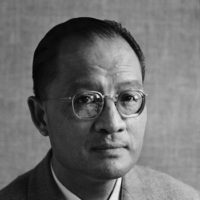
Choh H. Li
Hormone Research Laboratory University of California
For the identification and isolation of six hormones of the anterior pituitary gland.
Since 1938, C.H. Li, professor of biochemistry and experimental endocrinology and director of the Hormone Research Laboratory at the University of California, has been engaged in intensive studies of the chemical basis for the endocrine activities of the pituitary gland. By great perseverance and experimental ingenuity, he and his colleagues have isolated in pure form, from the pituitaries of diverse species including man, six of the polypeptide (small protein) hormones made by this gland. These six hormones are growth hormones, ACTH, three gonadotropins—FSH (follicle-stimulating hormone), ICSH (interstitial cell-stimulating hormone) and prolactin (lactogenic hormone)—plus MSH (intermedin) of the intermediate lobe of the pituitary.
With the newly developed techniques of amino acid sequence analysis, he determined the complete structure of ACTH and melanocyte-stimulating hormone, and the gross structures of growth and lactogenic hormones from various sources. These are indeed enormous contributions which required a vast amount of labor performed with consummate skill. Recently, his laboratory accomplished the partial chemical synthesis of ACTH. Their synthetic polypeptide of the first 19 amino acids of the normal chain of 39 amino acids was found to exhibit, albeit in moderate degree, all of the biological activities of the native hormone.
In parallel with these chemical studies his laboratory has pursued a program designed to correlate the nuances of chemical structure among these polypeptide hormones with their diverse biological effects. His recent studies of the mechanism of action of human growth hormone have provided the only information available concerning the modus operandi of this key hormone.
Thus, Dr. Li's comprehensive, ingenious and painstaking research on the pituitary hormones has provided purified hormones for all to study—synthetic tools which promise, one day, to make available abundant supplies of these valuable agents and a better understanding of the specific functions of pituitary hormones and their possible uses in the treatment of diseases. Truly is mankind in his debt.
